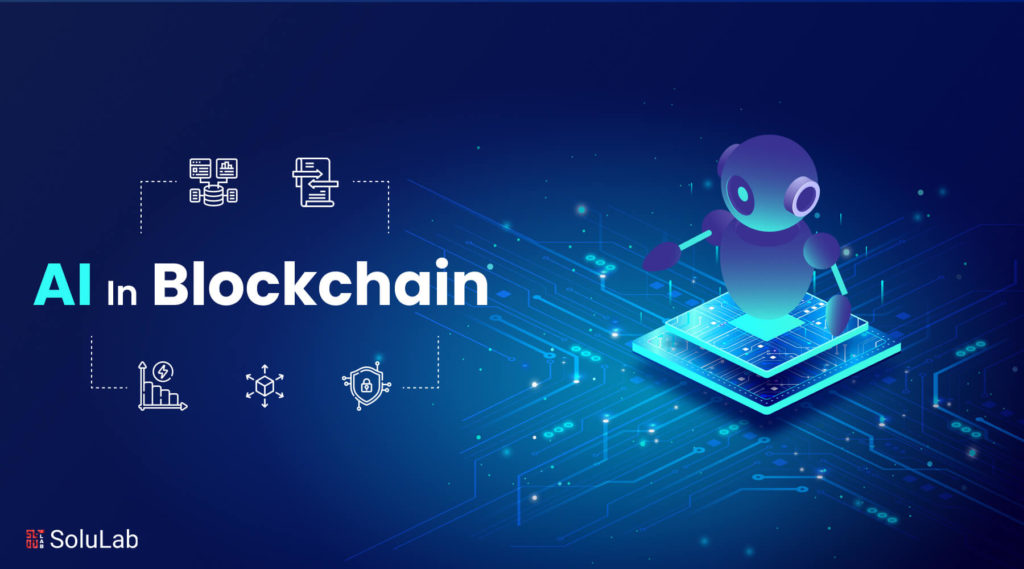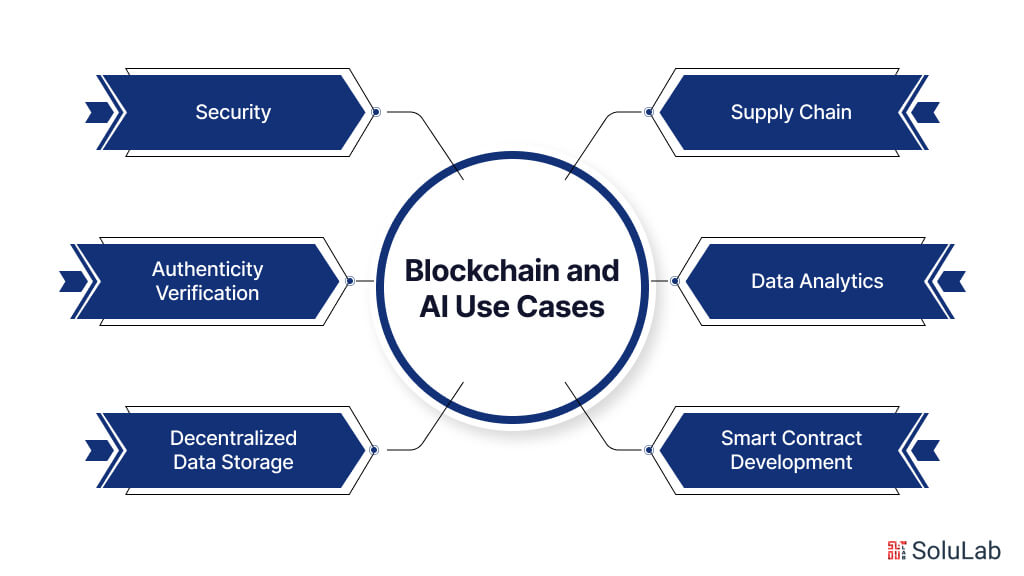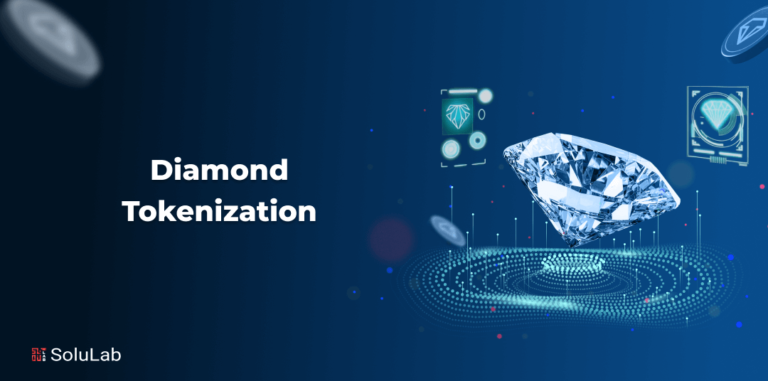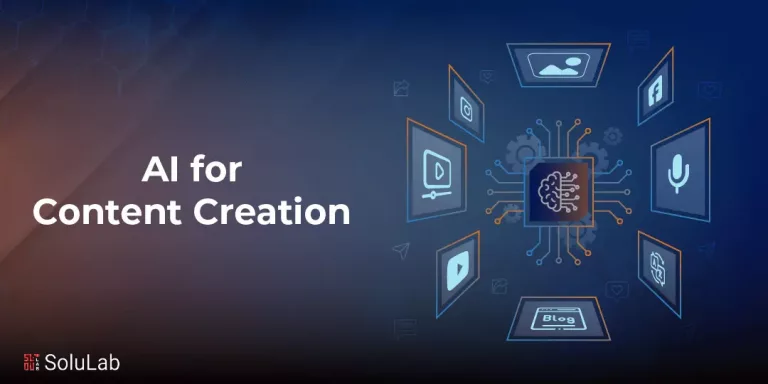
Two major contenders in this evolving digital environment are blockchain technology and artificial intelligence (AI). Each of them has had a big influence on different businesses and how people interact in society. But the possibilities they provide together usher in a completely new age. Among other industries, supply chain logistics, healthcare, and cybersecurity might all be revolutionized by the combination of AI and Blockchain. To put it plainly, the innovations supported by the combination of them are genuinely unmatched.
In this blog, we look at the current trends and applications of AI and Blockchain, as well as the areas of synergy between the two industry titans.
The Coming Together of Blockchain and AI
Deep learning models use complex neural networks that imitate the thinking processes of the human brain to analyze enormous volumes of data, find patterns, forecast outcomes, and facilitate decision-making. A blockchain network provides an Internet-native, transparent, decentralized, and censorship-resistant financial settlement layer that minimizes trust and allows for immutable data storage and permissionless digital transactions.
The combination of blockchain technology and artificial intelligence (AI) has the potential to open up completely new business opportunities, boost organizational productivity, help automate tedious tasks for individuals, facilitate safer and more effective data exchange, optimize decision-making processes through AI-powered smart contracts, and increase public confidence and transparency in important economic and infrastructure processes.
Beyond conventional commercial blockchain and AI applications, the combination of blockchain technology and artificial intelligence (AI) has the potential to yield several advantages. Data-driven decision-making and more effective resource management could be made possible by fusing the potent analytical powers of AI with the safe, decentralized structure of blockchains. These applications could be made in a variety of fields, including education, healthcare, energy, social impact, agriculture, and urban planning.
Blockchain and AI Use Cases

We’ll look at a number of possible use cases in this section to show the potential benefits of integrating blockchain technology and artificial intelligence.
-
Security
One of the best blockchain AI use cases is the implementation of security. Blockchain technology and decentralized infrastructure can serve as AI systems’ encryption-backed safety nets. According to this approach, AI systems may be implemented with built-in protections that lessen the possibility that they would be abused or exploited in hostile ways. AI developers may specify the precise constraints that AI must adhere to in order to access different key systems, and private keys, in conjunction with tamper-proof decentralized infrastructure like as blockchains, smart contracts, and oracles, can impose these constraints.
Decentralized, blockchain-based systems offer robust security against manipulation by adversaries, a feature that extends to combating adversarial AI agents. Unlike centralized systems vulnerable to single points of failure, decentralized infrastructure disperses across multiple nodes and private keys, increasing resilience against compromise. This fusion of AI’s utility and blockchain’s security mitigates attack vectors, enabling organizations to harness AI’s potential while ensuring cryptographic security measures uphold stringent standards.
-
Supply Chain
Smart contracts, computer programs hosted and executed on blockchains, offer inherent advantages when combined with artificial intelligence (AI). AI models integrated into smart contracts can utilize predefined conditions to automate tasks, such as detecting inventory shortages and executing orders with suppliers. This seamless integration enhances efficiency and accuracy in executing predetermined actions, streamlining processes like inventory management.
Moreover, the synergy between blockchain and AI can revolutionize transparency and fraud prevention by digitizing paper-based processes and enabling real-time tracking of goods. By merging AI-driven predictive analytics with blockchain technology, companies gain insights into demand patterns, optimize inventory management, and make data-driven decisions to minimize costs. This combination extends beyond business applications, as seen in disaster relief scenarios. Through AI-driven analytics and blockchain-based supply chain tracking, humanitarian organizations can optimize resource allocation during natural disasters by providing real-time data on supply availability and locations, ensuring that essential supplies reach their intended destinations promptly and efficiently.
-
Authenticity Verification
The advent of deep learning models like DALL-E and Stable Diffusion has underscored AI’s capacity to generate rich media from textual prompts, yet the proliferation of synthetic content poses risks of misinformation and deep fakes. In response, blockchain technology emerges as a pivotal trend in blockchain app development, offering cryptographic validation and timestamping to authenticate media origin and integrity. This cryptographic watermarking not only bolsters trust in decentralized platforms for content curation and distribution but also ensures transparency and verifiability in an era where discerning between genuine and altered content is crucial for societal stability.
Moreover, the rise of blockchain tokens, notably non-fungible tokens (NFTs), signifies a transformative trend in verifying digital content’s authenticity and provenance. As a key blockchain app development trend, NFTs enable content creators to establish a unique digital fingerprint for their work, facilitating transparent tracking of ownership history and modifications. This standardization of technology not only promotes accountability among publishers but also empowers users to confidently distinguish between authentic and manipulated content, thereby fostering a more trustworthy digital technology.
-
Data Analytics
Blockchain technology offers unparalleled data provenance, ensuring data integrity by storing information in a secure and decentralized network. This feature makes blockchain networks ideal for large-scale data analytics, as they provide a reliable foundation for analyzing vast datasets. As blockchain increasingly shapes human economic and social activities, sophisticated machine learning models can leverage on-chain data to identify trends and offer predictive insights. This empowers businesses and individuals to make informed decisions, capitalizing on opportunities within the evolving on-chain economy.
Moreover, AI models play a crucial role in optimizing calculations for consensus algorithms in blockchain systems like Bitcoin mining. By employing AI, blockchain nodes can decrease latency and compute requirements, enhancing the efficiency of the consensus process. This synergy between blockchain technology and AI not only enables more efficient blockchain operations but also facilitates the extraction of valuable insights from on-chain data, further propelling innovation and growth within the blockchain ecosystem.
-
Decentralized Data Storage
Blockchain-based storage solutions like Filecoin, IPFS, and Arweave offer decentralized storage options that can maintain the integrity of training data and ensure its accurate provenance. Furthermore, employing advanced encryption methods can enable the training of deep learning models on encrypted datasets, safeguarding privacy and confidentiality.
Incorporating blockchain-based storage solutions into the deep learning infrastructure can bolster the security and dependability of AI systems, while also fostering transparency and trust in their decision-making processes.
-
Smart Contract Development
The emergence of AI-assisted development tools like GitHub Copilot has revolutionized smart contract development, exponentially boosting developers’ productivity. Leveraging AI-powered APIs, smart contract applications can now integrate real-world sensor analytics, sentiment analysis, and generative models, ushering in a new era of Web3 applications. This fusion of blockchain and AI applications holds immense potential to enhance the functionality and versatility of smart contracts, paving the way for innovative decentralized solutions across various industries.
Moreover, AI will revolutionize Web3 gaming experiences by enabling game developers to effortlessly create entire game worlds, assets, non-player characters, and scripted events using natural language and generative AI models. By codifying game mechanics on-chain, developers can ensure transparency and immutability while fostering collaborative game development efforts driven by open-source code and AI-generated content. This integration of blockchain and AI not only redefines the gaming landscape but also exemplifies the boundless possibilities when these technologies converge in Web3 ecosystems.
Challenges and Considerations for AI in Blockchain
While the integration of AI into blockchain technology holds tremendous promise, it also presents several challenges and considerations that need to be addressed. Here are a few of the challenges that come with the integration of AI in blockchain.
- Scalability: Integrating AI algorithms into blockchain networks may strain computational resources, exacerbating scalability challenges.
- Data Privacy and Security: AI models trained on sensitive data stored on the blockchain raise concerns about privacy and confidentiality, necessitating robust security measures.
- Interoperability: Establishing standards and protocols for interoperability between AI and blockchain systems is essential to facilitate seamless integration across different networks.
- Ethical Considerations: Ensuring transparency, fairness, and accountability in AI decision-making processes is crucial to mitigate biases and address ethical concerns.
- Regulatory Compliance: Developing legal frameworks and regulatory guidelines for the use of AI and blockchain technologies is necessary to navigate legal and ethical implications.
- Adversarial Attacks: Protecting AI models from adversarial attacks within blockchain networks requires enhanced security measures and defenses against malicious actors.
- Resource Management: Efficiently managing computational resources and optimizing AI algorithms for blockchain environments is vital for performance and sustainability.
- Education and Awareness: Promoting education and awareness about the capabilities and limitations of AI in blockchain applications is essential for fostering responsible development and adoption.
- Governance: Establishing governance mechanisms to oversee the deployment and operation of AI systems on blockchain platforms can ensure accountability and compliance with industry standards.
- Collaboration: Encouraging collaboration between technologists, policymakers, and stakeholders is critical for addressing challenges and unlocking the full potential of AI in blockchain applications.
The Future of AI With Blockchain
Blockchain facilitates cooperation, value transfer, and trust minimization at scale, whereas AI allows intelligence at scale. When integrated, these technologies may improve security, transparency, and general efficiency, opening up new opportunities and benefiting many different businesses.
Combining AI with blockchains has enormous potential to impact many different areas. AI models are anticipated to continue spreading into many economic sectors as businesses work to automate processes, increase efficiency, and improve their business offers by incorporating AI into a significant percentage of software products.
At the same time, while institutional trust has been steadily declining for decades, people are becoming more and more drawn to apps that rely on cryptographic promises. These two seismic breakthroughs in technology are coming together to radically alter our economy and civilizations.
The Bottom Line
In conclusion, the intersection of AI and blockchain represents a frontier of innovation with vast potential to reshape industries and drive transformative change. Current applications of AI in blockchain, such as enhancing data integrity, optimizing smart contracts, and revolutionizing Web3 gaming experiences, demonstrate the diverse ways in which these technologies can converge to create value. However, as with any emerging technology, challenges such as scalability, data privacy, and regulatory compliance must be carefully navigated to unlock the full potential of AI in blockchain applications.
By addressing these challenges collaboratively and leveraging the expertise of companies like SoluLab, which specializes in AI development and blockchain solutions, businesses can capitalize on the opportunities presented by this exciting convergence. With SoluLab’s comprehensive AI development solutions and blockchain development services, organizations can harness the power of AI and blockchain to drive innovation, improve efficiency, and stay ahead in today’s rapidly evolving digital era. Contact us today to explore how SoluLab can help navigate the complexities of AI in blockchain and unlock new possibilities for your business.
FAQs
1. What are some current applications of AI in blockchain?
Current applications of AI in blockchain include enhancing data integrity through decentralized storage solutions, optimizing smart contracts with AI-assisted development tools, and revolutionizing Web3 gaming experiences by leveraging AI-generated content.
2. How does AI improve the functionality of blockchain technology?
AI enhances the functionality of blockchain technology by providing advanced analytics, predictive insights, and automation capabilities. AI-powered algorithms can analyze large datasets on the blockchain, identify patterns, and offer actionable intelligence for informed decision-making.
3. What challenges exist in integrating AI with blockchain?
Challenges in integrating AI with blockchain include scalability issues due to computational resource constraints, concerns about data privacy and security, interoperability between different AI and blockchain systems, and ethical considerations surrounding AI decision-making processes.
4. How can businesses leverage AI in blockchain applications?
Businesses can leverage AI in blockchain applications to enhance data integrity, automate processes, optimize smart contracts, improve decision-making with predictive analytics, and develop innovative decentralized solutions across various industries.
5. Why choose SoluLab for AI development and blockchain solutions?
SoluLab specializes in AI development and blockchain solutions, offering comprehensive services to help businesses harness the power of AI in blockchain applications. With expertise in AI algorithms, blockchain development, and a commitment to delivering innovative solutions, SoluLab provides tailored services to meet the unique needs of each client.






